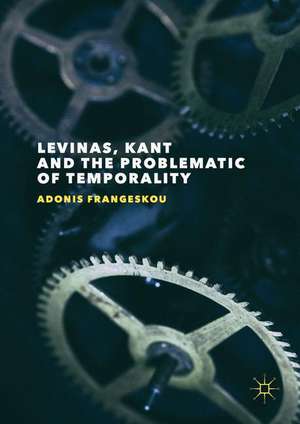Levinas, Kant and the Problematic of Temporality
Autor Adonis Frangeskouen Limba Engleză Hardback – 20 noi 2017
Preț: 528.13 lei
Preț vechi: 621.33 lei
-15% Nou
Puncte Express: 792
Preț estimativ în valută:
101.07€ • 104.41$ • 84.12£
101.07€ • 104.41$ • 84.12£
Carte tipărită la comandă
Livrare economică 26 martie-09 aprilie
Preluare comenzi: 021 569.72.76
Specificații
ISBN-13: 9781137597946
ISBN-10: 1137597941
Pagini: 206
Ilustrații: XV, 223 p.
Dimensiuni: 148 x 210 mm
Greutate: 0.44 kg
Ediția:2017
Editura: Palgrave Macmillan UK
Colecția Palgrave Macmillan
Locul publicării:London, United Kingdom
ISBN-10: 1137597941
Pagini: 206
Ilustrații: XV, 223 p.
Dimensiuni: 148 x 210 mm
Greutate: 0.44 kg
Ediția:2017
Editura: Palgrave Macmillan UK
Colecția Palgrave Macmillan
Locul publicării:London, United Kingdom
Cuprins
PART I: FROM KANT TO HEIDEGGER.- 1. The Ontological Destruction of the Schematism.- 2. Grounding Metaphysics in the Existential Temporality of Dasein.- PART II: FROM HEIDEGGER TO LEVINAS.- 3. Time, Temporality, and the Opening Up of Presence.- 4. From Presence to Absolute Presence: The Supreme Diachronism.- PART III: FROM LEVINAS TO KANT.- 5. Toward an Ethical Destruction of the Schematism.- 6. Grounding Metaphysics in the Diachronic Temporality of the Other.
Notă biografică
Adonis Frangeskou obtained his PhD in Continental Philosophy at Staffordshire University, UK, where he also held a part-time teaching position. He is an executive member of The British Society for Phenomenology and is currently Visiting Lecturer in Social Theory at the University of the West of England, UK/Alexander College, Cyprus.
Textul de pe ultima copertă
The book offers an ethical interpretation of the Critique of Pure Reason by establishing the historical connection between the problematic of Temporality in the philosophies of Heidegger and Levinas on the one hand, and the ground-laying of metaphysics in the schematism of Kant’s critical philosophy on the other. Drawing on Levinas’ ethical critique of the Heideggerian problematic of Temporality together with his destructive proposal to carry out the deformalization of the Kantian notion of time in a manner consistent with Rosenzweig’s philosophy, the book argues that this historical connection should be established at the point where Kant determines the ethical status of the schematism according to the regulative schemas of the ideas of pure reason, and not, as in Heidegger’s ontological destruction, at the point of his determination of the sensible schemas of the pure concepts of understanding alone.
Caracteristici
Takes a novel approach to the analysis of the schematism of Kant’s critical philosophy through Levinas' critique of Heidegger Offers an alternative to mainstream readings of Levinas' relationship with Kant's work Challenges the reader to engage with Kant's work from a radically alternative standpoint Includes supplementary material: sn.pub/extras
